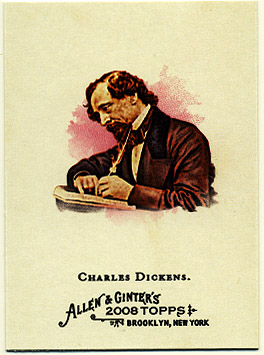

Yes, sometimes students wonder if the study of the past really has any relevance to the present, aside from meeting a specific graduation or college degree requirement. Well, here is a sports card devoted to Charles Dickens which appeared in the 2008 Topps Allen & Ginter set of cards (#219 of the set)
Charles John Huffam Dickens (1812-1870) experienced family privations as he grew up. His father was a navy pay clerk in Portsmouth, England, but because of debt and poverty problems, the family moved often. Early in his life, the young boy worked in a factory making shoe polish. There he experienced first-hand the effects of the Industrial Revolution. He later became a reporter in London and began to publish literary sketches in the early 1830s. At the end of 1837 the Posthumous Papers of the Pickwick Club appeared in book form and sealed his literary debut. In the work, Dickens focused on a stark portrayal of the lower classes. Other important novels followed, usually in serialized form first: The Adventures of Oliver Twist (1838), The Life and Adventures of Nicholas Nickleby (1839), David Copperfield (1849), A Tale of Two Cities (1859), Great Expectations (1860) and A Christmas Carol (1843).
I listed A Christmas Carol last. Even though Dickens over the course of his very prolific life as a writer published many novels which have since entered the Western canon of great works, it is his short A Christmas Carol (1843) that has become his most famous and well-known work--I end up watching some of the many dozens of versions every Christmastime. I did a quick search on IMDB for movies based on the story and found over fifty different movies, spanning from 1908 to the present, in all kinds of formats and with all kinds of story variations, including versions starring the Flintstones, Bugs Bunny, Mister Magoo (one of my favorites), the Muppets, George C. Scott, etc. I have no idea of how many times it has appeared in other languages.
Dickens published Hard Times in 1854 as an overt critique of the impact that industrialization/urbanization was having on England. By that time, he was active in many social reform issues, such as slum clearance, reform of prostitutes, improvement of working conditions. In some ways, he was a forerunner of the later writers who were known as naturalists, such as Émile Zola (1840-1902) in France--read Germinal (1885) sometime if you dare to sample the despair of nineteenth-century French miners and their horses.. The naturalists went beyond simply describing the world; they sought to identify the underlying forces influencing man and the environment. They also sought to produce an effect.
In other ways, Dickens was firmly in the camp of the realists who had evolved from the romantic movement. Realism attempted an accurate portrayal of the real world and focused on a careful use and description of facts. Realists tended to be critics of society and disdainful of sentiment. "Let's study the hard facts of life," the external world of the Industrial Revolution, and "let's examine the psychological and social problems of people." There is no place for sentimentality (or the poetry of the Romantics). With regard to Dickens and Hard Times, we have a real historical figure grappling with the impact of a real historical process, the Industrial Revolution, as it unfolded around him, and he aimed to expose its short-comings in a work of fiction, the novel, to protect the names of the innocent.
There are quite a lot of very good resources about Dickens online (see below), and his many works are also available online where you can read them for free. After all, he wrote in English, and what he wrote then in English is the same English that we use today. So there is no copyright problem with his works.
Dickens married Catherine Hogarth, with whom he had ten children, but the marriage failed in the late 1850s. On his death, Dickens was interred in Poet's Corner in Westeminster Abbey.
Some recommended online lectures and websites:
- Charles Dickens Biography and Works This particular site links to a number of very useful articles and reviews of Dickens works and different biographies.
- A number of Dickens books are on Google books, including Great Expectations. As I note, many of his works are online. You can check the wikipedia entry for some links.
- Charles Dickens a short biography.
- Dickens is a three-part PBS series devoted to his life and work.
- The Charles Dickens Museum is located in his nineteenth-century home. There is also Dickens Birthplace Museum.
- The Dickens Project. is a scholarly site devoted to the study of Dickens. Another scholarly project, the Victorian Web, has materials dedicated to Dickens.
- The Complete Works of Charles Dickens are available online.
- David Perdue's Charles Dicken page
- Another short biography
- A Christmas Carol, the compete text from 1843. There are som many versions to choose from. I like the Mister Magoo version, or sometimes the one starring the Muppets.
- A Charles Dickens Journal, a timeline of his life
- The Dickens Fellowship, an international society dedicated to the study of Dickens and his writings
- Charles Dickens: A Comprehensive Resource, Biography, Life and Literature
- For extra credit please suggest to your instructor a
relevant website for this unit of the course. Send the title of the site, the url and a
brief explanation why you find the information interesting and applicable to
the material being studied in this unit.